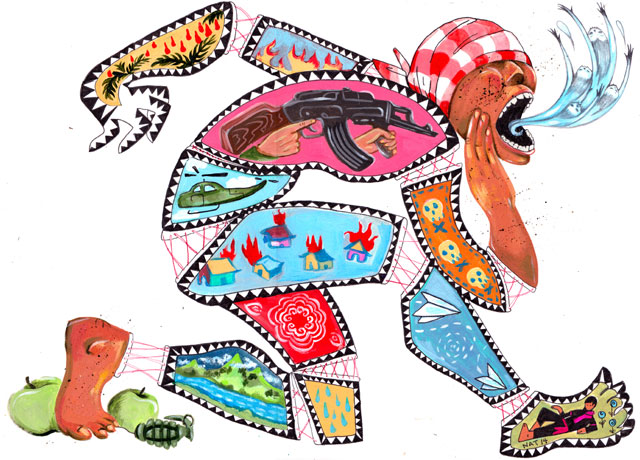The sixth part of a Southeast Asia Globe series that shines a light on the region’s finest poetry
Compiled by Nathan A. Thompson Illustration by Natalie Phillips
The Hmong are an ethnic group from the mountainous regions of Laos and several other Southeast Asian countries. During what is known as The Secret War, between 1953 and 1975, many Hmong were recruited by US forces to oppose Pathet Lao insurgents and North Vietnamese communists. The communist victory in December 1975 forced tens of thousands to flee to the US after the victors promised to exterminate the Hmong “to the last root”, as stated by the official Pathet Lao newspaper in May 1975.

The two poets featured this month were children at the time of the Hmong exodus (or genocide, as some have claimed). Their poems are some of the first written by Hmong, who have not had a written language throughout their 4,000-year history. It is strange to think Hmong literature now only exists in the language of one of the nations that caused them to be ripped from their homeland. Nevertheless, the impetus to nurture what is left is paramount: “Our parents will never write. So we write for them,” poet Soul Choj Vang told The New York Times in 2011.
His poem, “Here I Am”, is about the experience of the refugee. The repeated questions simulate the grasping of the poet towards an understanding of the alien culture surrounding him. The line, “unable to taste the spirit in its dust”, points to his experience of being unable to communicate in a land where nobody speaks his language. It’s as though his mouth is full of dust, rendering him speechless.
Bryan Thao Worra is the most well known of the new Hmong poets. “Write, they tell me, so people won’t forget,” he says in “The Last War Poem”, describing how young Hmong shoulder the responsibility of recording their history. His poem is built of short, declarative sentences; each full stop is like a bullet giving the poem a broken, maimed feeling. The effect is as dignified and powerful as an inscribed war memorial, where every word does “stand as a monument”.
***
“The Last War Poem” by Bryan Thao Worr
I tell you, this is the last word for this war.
This little side war we were the center of.
There is no justice from poetry –
Any veteran can tell you that.
They want their land, their lives
Their livestock back.
Grenade fishing in the aftermath of Phou Pha Thi
Has lost its novelty
To the man with a bullet fragment rattling
In his body, slowly tearing him apart.
Write, they tell me. Write what?
We lost, we were forgotten, we are ghosts.
We are victims of fat tigers and foreign policy.
There is no Valhalla, only memories of Spectre gunships.
There is no Elysium, only pleas for asylum.
This jungle was filthy.
There was shit. There was blood. There were refugees
Who to this day can not explain why they were the enemy
When the Communists came.
Their sons fought. Their brothers died.
Their uncles, maimed,
were hauled screaming into the shadows of the PDJ.
Write, they tell me, so people won’t forget. So someone will know.
Lift the broken bodies with my words, bring them out
And say ‘we did not die in vain’.
For every bullet hole, let there be a word to stand as a monument.
For every lost limb let there be a sonnet to stitch the truth back together.
For every eye gone blind, let there be something to take its place.
Something. Anything.
How can you not have words for the war of whispers?
How can you not shout, now that the whispering is done?
And I swear, each time I break this promise, that the next time
Will be the last word I write about this damn war.
***
“Here I Am” by Soul Choj Vang
Once, American poets were born
in the factories of Detroit,
the vineyards of the Great Valley,
the haunted plantations of the South,
but they were all raised on the plains of Iowa.
They wrote about life enclosed
by picket fences, children creating
kingdoms under apple orchards,
tornadoes turning trees into rows of corkscrews
and carrying trout
miles out of rivers.
Now, here I am, adopted citizen,
not rooted in this land, unable to taste
the spirit in its dust,
to sense its moods in the pollen.
How do I begin my song?
Where do I enter the chorus
when my part is not yet written,
when the conductor won’t point
my way?
Shall I start with my birth on Sky Mountain?
Then follow with my childhood,
shaping paper planes to ride the wind?
Or shall I tell of my boyhood,
playing on the shore of the Dragon River
That flowed like a cool blue ribbon
and raged into a yellow monster
during the monsoon season?
Shall I sing of fleeing
my homeland, knowing I was leaving
the mountains and gorges forever?
Should I sing of crossing
the Mekong, floating on a bamboo raft?
Or sing of my coming to this land, as a beggar,
wishing to share my story,
but unable to speak the language?
If I sing of these things
who would listen to me,
who knows nothing of picket fences,
the sanctuary of apple orchards,
or lessons of tornadoes?
I will have to relearn
and trust my childhood, give
the wind my song
and let all who can,
hear.
***
Keep reading:
“My country and my people, I never understood” – The first part of a Southeast Asia Globe series that shines a light on the region’s finest poetry
“There is a country and there is no rule” – The second part of a Southeast Asia Globe series on the region’s finest poetry
“Night falls onto a sinful whispering realm” – The third part of a Southeast Asia Globe series on the region’s finest poetry

